Key takeaways:
- Personal stories and experiences, such as witnessing the trauma of veterans and the resilience of displaced families, play a crucial role in motivating advocacy for peace.
- Effective advocacy hinges on clear messaging and storytelling, as personal narratives resonate deeply and foster connections among supporters.
- Notable anti-war leaders like A.J. Muste and Malalai Joya demonstrate the courage and commitment needed to challenge the status quo and inspire collective action for peace.
- Grassroots organizing and coalition-building are essential strategies for amplifying impact and mobilizing communities towards peaceful solutions.
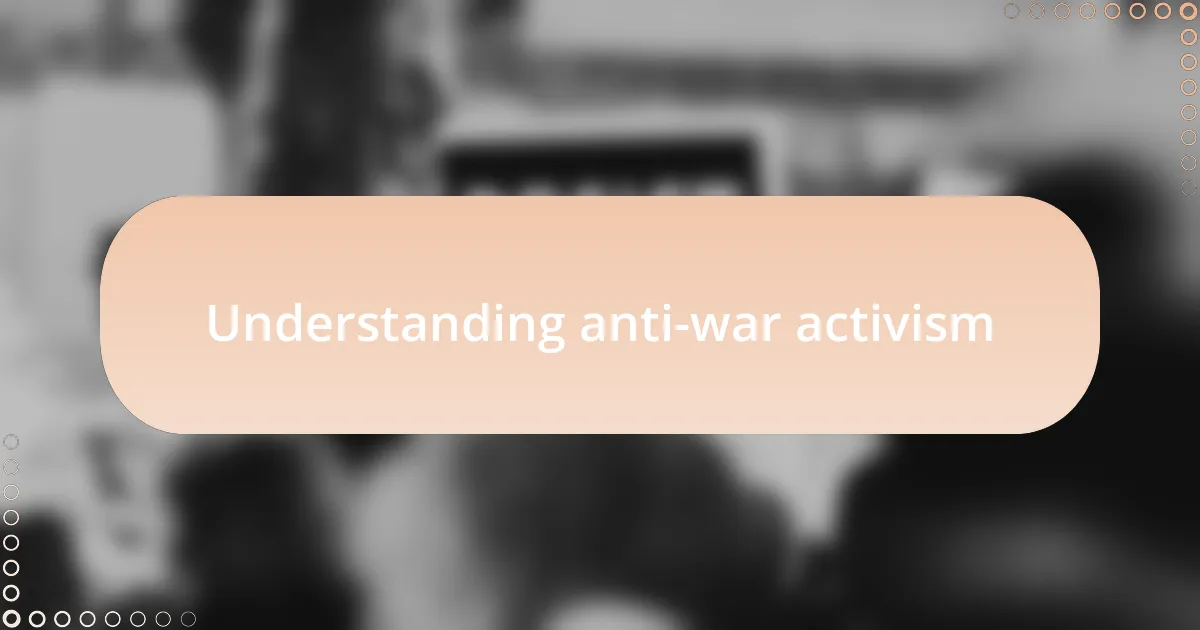
Understanding anti-war activism
Anti-war activism emerges from a deep belief that conflict often leads to unnecessary suffering. As I pondered the consequences of war, a memory surfaced: witnessing a friend’s brother return home traumatized from combat. It struck me how vital it is to advocate for peaceful solutions, prompting questions about how we can truly understand the devastating impacts of war on individuals and families.
Engaging with this issue reveals complex layers of human emotion and social responsibility. I remember attending a local rally where participants shared stories of loss and resilience. These narratives resonated deeply, making me wonder: how can one voice, one story, spark a movement? This realization ignited my passion for raising awareness and forging connections among those who share a vision of a more peaceful world.
At its core, anti-war activism seeks to challenge the status quo and promote empathy over aggression. Reflecting on my own experiences, I noticed how easy it is to become numb to the news of distant conflicts. However, when we humanize the statistics—when we see beyond numbers to the lives they represent—we empower ourselves to advocate for change. Isn’t it our duty to ensure that every story matters?
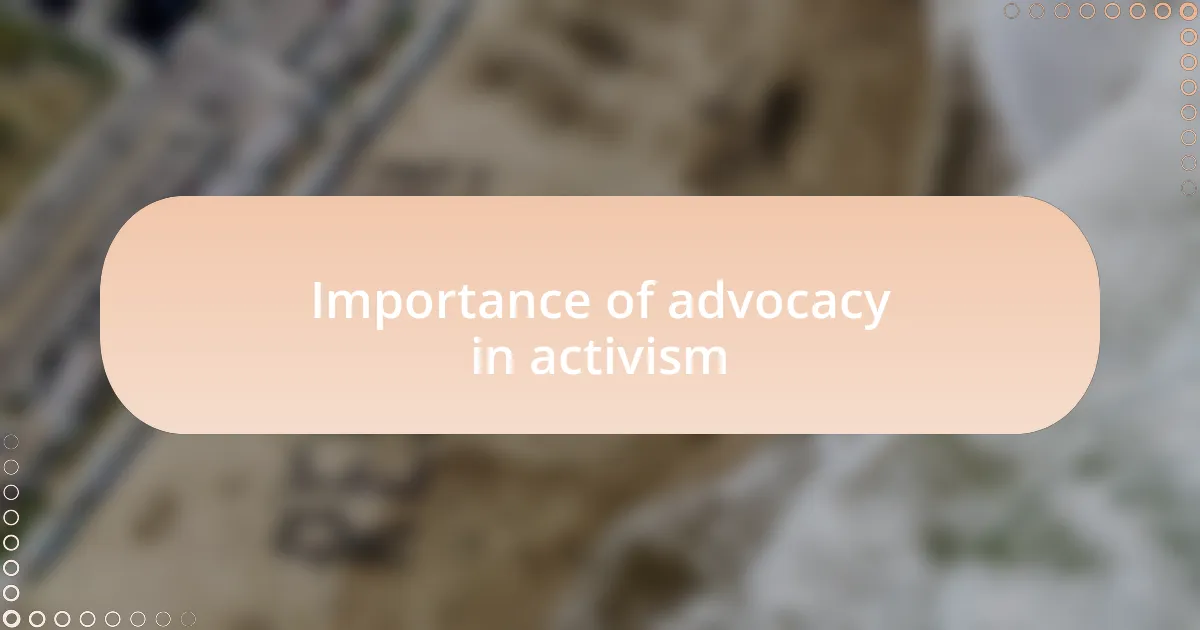
Importance of advocacy in activism
Advocacy plays a crucial role in anti-war activism. I remember a time when I attended a community forum discussing the effects of war on mental health. Listening to speakers who had lived through the horrors of conflict was eye-opening; it became clear that their stories were the catalysts that ignited awareness and fueled action. It made me wonder: how many voices remain unheard simply because they’re not advocated for?
By standing up for those affected by war, we amplify their experiences and elevate their struggles. I often reflect on a powerful moment at a vigil where individuals shared how the impact of war extended beyond the battlefield and into the hearts of families. Isn’t it astonishing how a single story can resonate with so many and inspire collective action? This collective energy underscores the importance of advocacy in transforming pain into purpose, encouraging communities to unite for peace.
Moreover, advocacy in activism nurtures a sense of accountability. During a visit to a local school, I helped facilitate a discussion about how young people can influence policy changes related to military actions. Witnessing their passion made me realize the power of informed youth in shaping the future. Don’t you think that when we encourage the next generation to speak out, we are equipping them to cultivate a more peaceful world?
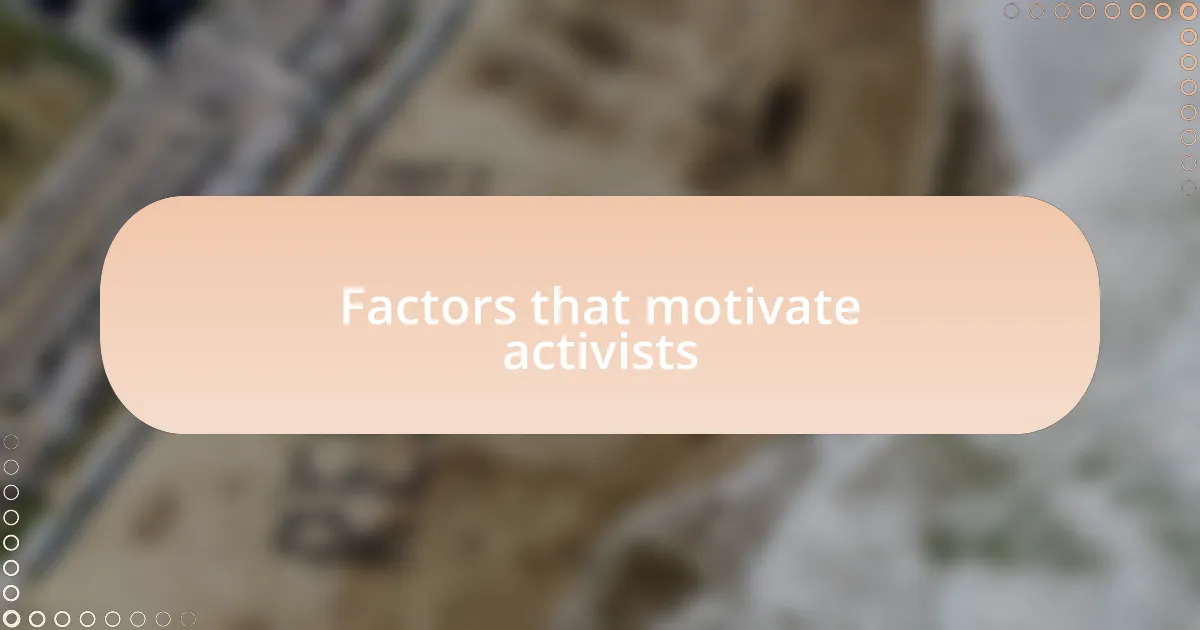
Factors that motivate activists
When delving into what motivates activists, I often think back to my first rally against war. The raw energy of the crowd, all united by a shared vision, was electrifying. It was a profound realization for me: the sense of community can become a powerful motivator, encouraging individuals to take action when they witness others fighting for a common cause. Have you ever felt that rush of adrenaline when you join voices with like-minded individuals?
Another factor that drives many activists is personal experience. I remember speaking with a friend who had family members affected by war; her determination to advocate for peace stemmed from a place of deep love and pain. When one’s own life story intertwines with the broader narrative of war, it transforms that personal pain into a rallying cry for change. How much do our personal connections shape our desire to speak out?
Lastly, awareness and education play significant roles in motivating activism. There was a time when I stumbled upon a documentary that showcased the devastating effects of war on innocent civilians. The heart-wrenching stories ignited a fire within me to educate others about the repercussions of violence. Isn’t it fascinating how knowledge can awaken a sense of urgency in us, pushing us to become advocates in our communities?
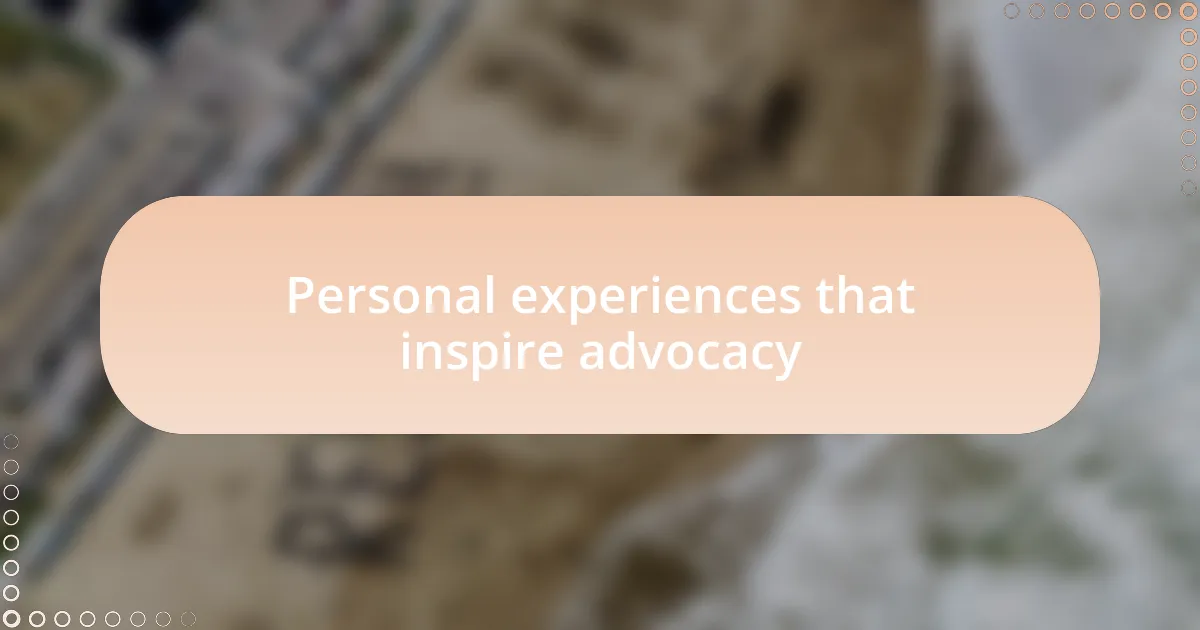
Personal experiences that inspire advocacy
I can still vividly recall the day I visited a veteran’s hospital with a group of volunteers. Walking through those halls and hearing the stories of men and women who had sacrificed so much for their country was profoundly moving. Their struggles with trauma and reintegration ignited a passionate need in me to advocate for peace—was it fair that they faced these battles long after the wars had ended?
Another significant moment for me occurred during a community discussion about the effects of war on displaced families. One mother shared her journey of escape, detailing her loss and resilience. Listening to her firsthand account was a poignant reminder of the human cost of conflict, and I found myself grappling with how easily we can overlook the stories of those most affected. Shouldn’t we all strive to ensure their voices are heard in the fight for peace?
Lastly, reflecting on my experiences in high school during anti-war discussions often brings a rush of emotion. I was part of a debate team, and while some argued for military action, I stood firmly on the side of advocating for diplomacy. The sense of responsibility I felt to speak up for those who couldn’t stand for themselves was powerful. How can we be silent when the stakes are so high for innocent lives caught in the crossfire?
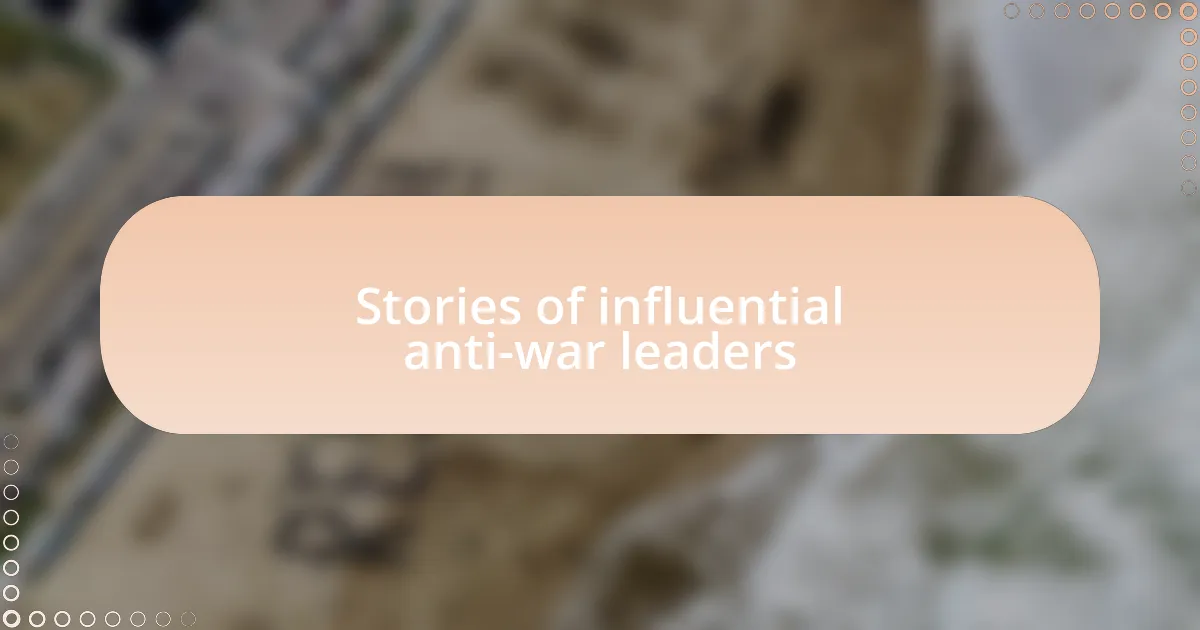
Stories of influential anti-war leaders
One figure that profoundly impacted anti-war advocacy is A.J. Muste, a minister turned activist who famously said, “There is no way to peace; peace is the way.” As I delve into his story, I am struck by his journey from pacifism to leading significant protests during the Vietnam War. His tireless efforts remind me that standing up against the tide of war requires immense courage and unwavering belief in a better future—can we all cultivate that resilience within ourselves?
Another influential leader is Howard Zinn, whose book “A People’s History of the United States” reshaped how I understood war’s impact on society. Zinn’s commitment to highlighting the voices of the marginalized instilled in me a sense of responsibility to advocate for peace. Reading his works, I often wonder: how can we ignore the lessons of history when they resonate so deeply in our current struggles for justice?
Then there’s Malalai Joya, the Afghan activist who dared to speak out against corrupt leadership in her country. Her determination to challenge the status quo, despite threats to her life, is a sobering reminder that the fight for peace extends far beyond borders. Personally, her story ignites a fire in me; if she can risk everything for her beliefs, what holds us back from joining our voices in the battle for genuine peace?
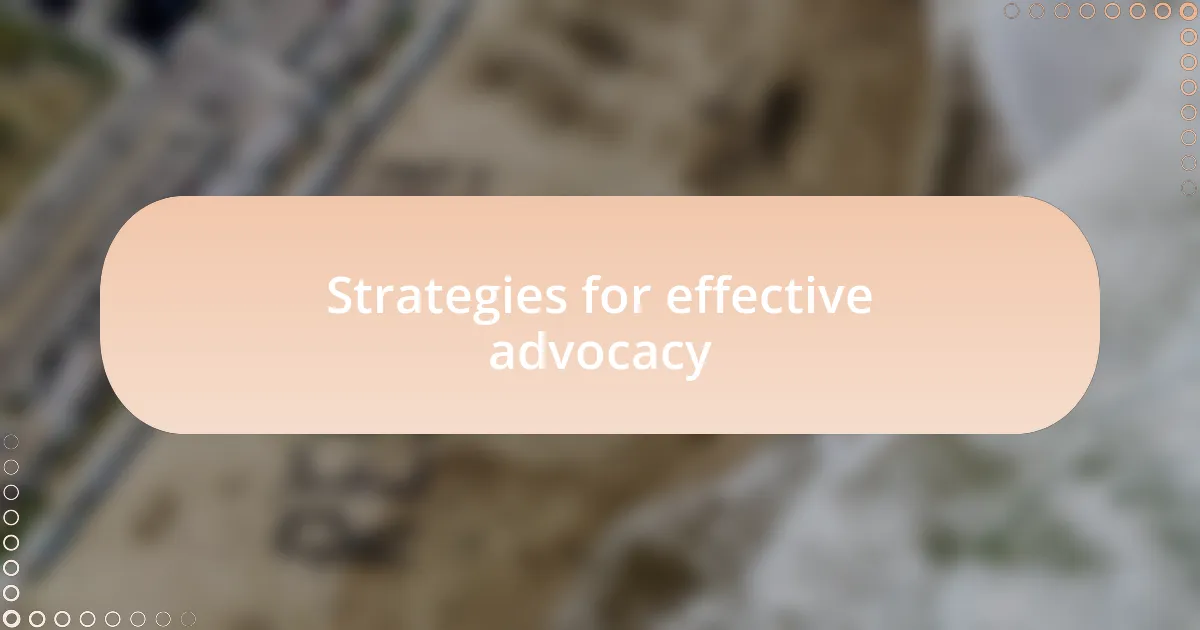
Strategies for effective advocacy
Effective advocacy requires a clear message that resonates with others. I’ve seen firsthand how powerful storytelling can be in drawing people into the cause. When I share personal experiences—like attending a local anti-war rally—I notice how those stories spark conversations. People connect more deeply when they can see a face behind the message, don’t you think?
Building coalitions can also amplify our impact. In my own advocacy efforts, I’ve collaborated with diverse groups, from local nonprofits to international organizations. Each partnership brings unique perspectives and strengths. This varied approach not only enriches our strategies but also demonstrates that the fight against war is a shared human concern, encouraging more voices to join in solidarity.
Engaging in grassroots organizing has proven invaluable in my journey as an advocate. I’ve learned that mobilizing communities around specific issues can lead to significant change. For instance, when we launched a campaign to oppose military funding in our city, the involvement of local schools and community centers was vital. Participating directly on the ground allowed me to witness the genuine passion that fuels advocacy, prompting me to ask: how can we harness that same energy to drive broader movements for peace?